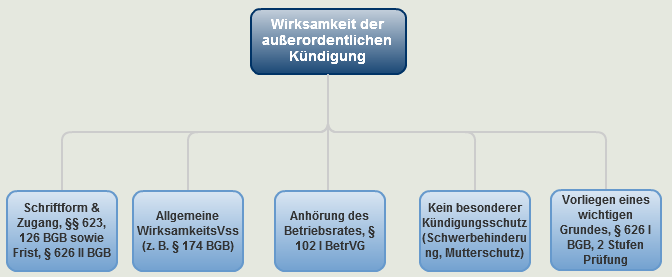Regional Labour Court Düsseldorf, 17.02.2012, Ref.: 17 Sa 252/11
In accordance with Section 626 (1) BGB, the employment relationship can be terminated for good cause without observing a notice period (termination without notice) if there are facts on the basis of which the terminating party cannot reasonably be expected to continue the employment relationship until the end of the notice period, taking into account all the circumstances of the individual case and weighing up the interests of both parties to the contract.
According to the established case law of the Federal Labour Court (BAG), the validity of a termination without notice in the context of a Ruling of the Federal Labor Court therefore be examined in two stages.
1. it must first be examined whether the facts of the case, without its special circumstances, are "per se", i.e. typically suitable as good cause.
2. in the second stage, a further examination is required to determine whether or not it is reasonable for the terminating party to continue the employment relationship, taking into account the specific circumstances of the case and weighing up the interests of both parties to the contract - at least until the end of the notice period.
However, in the case of a dismissal on suspicion in particular, a special procedure on the part of the employer is necessary for the dismissal without notice to be effective.
Suspicious dismissal exists if the employee was dismissed on suspicion of misconduct committed in the company.
In the vast majority of cases, this involves theft or embezzlement.
In the above-mentioned judgement, the parties disputed the validity of a termination without notice, or alternatively a termination with notice with an expiry date of 31 December 2010 due to embezzlement or the strong suspicion of embezzlement.
If you Labour law support please call us.
Facts and cancellation
In this case, a married man born in 1972, who was responsible for his family's maintenance, took legal action against the extraordinary termination of his employment contract with the defendant, where he had been employed as a cashier since 1997. His gross monthly salary most recently totalled € 3,239.70. The defendant accused him of having received €14.99 from a customer on 1 June 2010 without issuing a receipt and withholding the amount.
The defendant then terminated the employment relationship on 15 June 2010 without notice and alternatively with a six-month period of notice until 31 December 2010. The plaintiff filed an action for unfair dismissal against this termination with the labour court.
Decision of the labour court
The Labour Court ruled in favour of the plaintiff. It found that the plaintiff, as an election candidate, was subject to special protection against dismissal pursuant to Section 15 (3) sentence 2 KSchG. Dismissal without notice was only permissible if there was good cause. However, the defendant was unable to provide sufficient evidence that the plaintiff had unlawfully withheld the amount of €14.99.
Appeal to the regional labour court
The defendant appealed to the Düsseldorf Regional Labour Court, which confirmed the decision of the Labour Court. The Regional Labour Court found that neither the dismissal without notice nor the alternative dismissal with a social expiry period were effective. The defendant had based the dismissal on the suspicion of embezzlement, but was unable to prove that the plaintiff had actually kept the amount for himself.
Principles of dismissal on suspicion
The LAG pointed out that a dismissal on suspicion is only justified if there are strong grounds for suspicion based on objective facts and the employer has made all reasonable efforts to clarify the matter. The defendant was unable to present any concrete facts that would justify the suspicion of unlawful appropriation of the sum of money. The court also emphasised that the criminal assessment was not decisive for the assessment under dismissal law.
Overall, the employment relationship was not terminated by the dismissal, as the defendant had not provided the necessary evidence and justification for termination without notice.
Source: Düsseldorf Regional Labor Court
Important Note: The content of this article has been prepared to the best of our knowledge and belief. However, due to the complexity and constant evolution of the subject matter, we must exclude liability and warranty. Important Notice: The content of this article has been created to the best of our knowledge and understanding. However, due to the complexity and constant changes in the subject matter, we must exclude any liability and warranty.
If you need legal advice, feel free to call us at 0221 – 80187670 or email us at info@mth-partner.de.



One Response